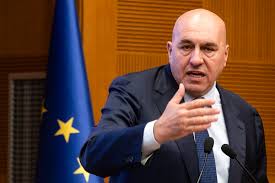How Italy views NATO’s 3% proposal

Rome: Italy cautiously supports NATO’s proposed 3% defence spending target, with Defence Minister Guido Crosetto calling for financial adjustments at the EU level.
The opposition endorses the plan while also advocating for defence Eurobonds. Strategic partnerships and an integrated defence industrial base remain crucial for achieving Europe’s security goals.
A new spending target. European NATO members are currently discussing raising the alliance’s defence spending target from 2% of GDP to 3%.
The proposal, reported by The Financial Times, is motivated by concerns over inadequate defence funding to support Ukraine and the potential return of Donald Trump to the White House.
This change is expected to be introduced at NATO’s annual summit next year and would require members to meet the new target by 2030.

“[W]ithout strong defence, there is no lasting security”, NATO Secretary General Mark Rutte said on Thursday, emphasising the need for improved spending, coordination, joint procurement, and sharing.
Crosetto’s conditional support. In an interview with Il Foglio newspaper, Italy’s Defence Minister, Guido Crosetto, expressed conditional support for an increase in defence spending, arguing that two key changes are needed at the European Union level.
Firstly, military expenditures should be fully excluded from the Stability and Growth Pact calculations—a measure currently only available under limited circumstances.
Secondly, Europe should establish a mechanism to guarantee lower interest rates for countries that increase their defence spending.
According to Crosetto, if meeting NATO’s obligations necessitates additional spending, the EU must provide financial support to facilitate this.
Opposition endorses, adds eurobonds. Lorenzo Guerini, the former defence minister and current chair of Italy’s intelligence committee (COPASIR), agrees with Crosetto’s proposals, but he also advocates for an addition: defence Eurobonds.
These bonds would pool European debt to finance defence initiatives, supporting the overall goal of achieving greater European strategic autonomy.
Guerini, a member of the Democratic Party, the main opposition party in Italy, views increased military spending as crucial for improving Europe’s defence posture and strategic independence—a longstanding priority of the centre-left.
Strategic partnerships and industrial base. An article in The National Interest by Atlantic Council’s Paolo Messa and Valbona Zeneli emphasises the need to decrease fragmentation in Europe’s defence sector.
It highlights the importance of initiatives like the joint venture between Italy’s Leonardo and Germany’s Rheinmetall, which aims to modernise Italian tanks and develop new armoured vehicles.
They also advocate for cooperative European defence financing mechanisms, such as the Eurobonds proposed by Guerini.
These steps are considered essential for meeting NATO’s increased spending targets and promoting a unified and efficient European defence industry.





